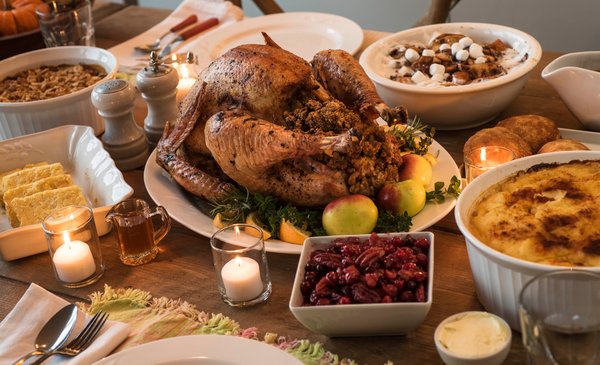Health
Thanksgiving Transformed as Ozempic and Weight Loss Drugs Gain Popularity

More than 12% of U.S. adults are now using GLP-1 weight loss drugs such as Ozempic, Zepbound, Wegovy, and Mounjaro, significantly impacting how Thanksgiving will be celebrated this year. This surge in usage comes as the obesity rate among American adults has decreased from 39.9% in 2022 to 37% in 2025, according to the Gallup National Health and Well-Being Index. With approximately 7.6 million fewer obese adults, holiday feasts may look quite different for many families.
The increase in GLP-1 drug usage is attributed to their effectiveness in suppressing hunger signals and slowing digestion, which helps users eat less. However, these medications can lead to discomfort if users overeat or consume food too quickly, potentially resulting in nausea, heartburn, and severe indigestion. For those participating in Thanksgiving celebrations, the impact of these drugs could create new challenges at the dinner table.
Navigating traditional holiday dishes can be particularly difficult for individuals using GLP-1 medications. Items such as turkey, gravy, stuffing, and pumpkin pie may be less appealing to those on these drugs. As families gather around the table, the question arises: how can guests politely refuse certain foods without causing offense?
Dr. Bajaj of Baylor University emphasizes the importance of addressing the stigma surrounding weight loss medications. He notes that these drugs are taken for health reasons, and overindulgence can result in illness. His advice encourages people to understand that refusing certain dishes is not a reflection of rudeness but a necessary choice for health.
Strategies for Hosts and Guests
To ease the potential tension at the holiday table, experts recommend several strategies for both hosts and guests. For those hosting, offering a variety of dishes can accommodate different dietary needs. Including lighter options and clearly labeling the ingredients can help guests feel more comfortable making choices aligned with their health goals.
Guests using GLP-1 medications might consider discussing their dietary preferences prior to the gathering, potentially alleviating awkwardness during the meal. Engaging in conversations about non-food-related topics can also help shift the focus away from eating habits.
With millions of Americans now using these medications, the presence of GLP-1 drug users at Thanksgiving is becoming increasingly common. As the social landscape adjusts, the pressure of traditional food-centric conversations may lessen, allowing families to connect over shared experiences rather than food choices.
As the holiday season approaches, the integration of health-focused discussions into family gatherings signifies a shift in attitudes toward weight management and wellness. Embracing these changes can create a more inclusive environment where everyone feels comfortable, regardless of their dietary restrictions.
-

 Science1 month ago
Science1 month agoIROS 2025 to Showcase Cutting-Edge Robotics Innovations in China
-

 Lifestyle1 month ago
Lifestyle1 month agoStone Island’s Logo Worn by Extremists Sparks Brand Dilemma
-

 Science2 weeks ago
Science2 weeks agoUniversity of Hawaiʻi at Mānoa Joins $25.6M AI Initiative for Disaster Monitoring
-

 Health1 month ago
Health1 month agoStartup Liberate Bio Secures $31 Million for Next-Gen Therapies
-

 World1 month ago
World1 month agoBravo Company Veterans Honored with Bronze Medals After 56 Years
-

 Politics4 weeks ago
Politics4 weeks agoJudge Considers Dismissal of Chelsea Housing Case Citing AI Flaws
-

 Lifestyle1 month ago
Lifestyle1 month agoMary Morgan Jackson Crowned Little Miss National Peanut Festival 2025
-

 Health1 month ago
Health1 month agoTop Hyaluronic Acid Serums for Radiant Skin in 2025
-

 Science1 month ago
Science1 month agoArizona State University Transforms Programming Education Approach
-

 Sports1 month ago
Sports1 month agoYamamoto’s Mastery Leads Dodgers to 5-1 Victory in NLCS Game 2
-

 Business1 month ago
Business1 month agoTruist Financial Increases Stake in Global X Variable Rate ETF
-

 World1 month ago
World1 month agoHoneywell Predicts Record Demand for Business Jets Over Next Decade









